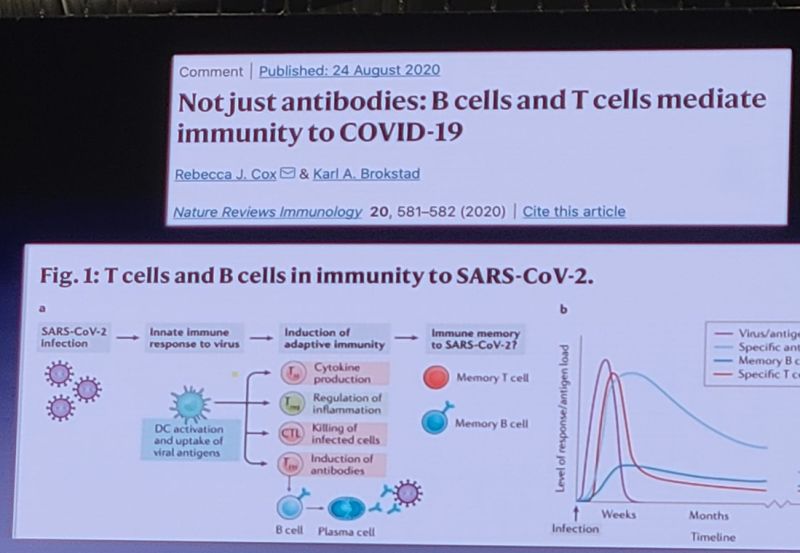Acquired Immunity
We know the antibodies are likely less effective, but maybe the T cells can save us - Daina Graybosch

image by: Rebecca Peck
HWN Recommends
Coronavirus: B cells and T cells explained
The adaptive immune system has evolved to provide a more versatile and highly target-specific defence with an ability to distinguish very subtle differences in the make-up of infectious agents. But the adaptive immune system is slow and can take several days before two key cell types – B cells and T cells – are brought into play.
T cells are further grouped into two sub-types, CD4+ and CD8+ cells. CD4+ are helper T cells that help the activity of other immune cells by releasing cytokines. The cytokines prime the maturation of B cells, which become plasma cells and produce antibodies to neutralise the pathogen. CD8+ cytotoxic T cells, on the other hand, directly kill infected cells.
Resources
 SARS-CoV-2 Actively Infects And Kills Lymphoid Cells
SARS-CoV-2 Actively Infects And Kills Lymphoid Cells
Recent reports have shown that marked lymphopenia is observed in 83.2% of SARS-CoV-2 patients, but little is known about how SARS-CoV-2 effectively dismantles one of our primary tools of defense.
 The Coronavirus Is New, but Your Immune System Might Still Recognize It
The Coronavirus Is New, but Your Immune System Might Still Recognize It
Some people carry immune cells called T cells that can capitalize on the virus’s resemblance to other members of its family tree.
 This is what long-term immunity to Covid-19 might look like
This is what long-term immunity to Covid-19 might look like
It’s this immune system memory that’s key to long-term protection against Covid-19. What’s reassuring is that as white blood cells get more practice against SARS-CoV-2, they seem to get better at containing the virus — even when it evolves into new variants. That appears to be happening in the omicron wave of Covid-19.
How the Aging Immune System Makes Older People Vulnerable to Covid-19
As we age, the immune system begins to shift into a heightened state of alert, dialing up inflammation and running out of certain immune cells.
Innate And Adaptive Immunity In The Human Intestine
Only recently have researchers come to realize that one of the major defenses against infection, especially in the gut, but also elsewhere, is mediated by a family of innate immune cells known as innate lymphoid cells (ILCs). In this series, we focus on one particular subset of this family, group 3 innate lymphoid cells (ILC3s), which have some remarkable and unexpected properties.
 Coronavirus: B cells and T cells explained
Coronavirus: B cells and T cells explained
T cells are further grouped into two sub-types, CD4+ and CD8+ cells. CD4+ are helper T cells that help the activity of other immune cells by releasing cytokines. The cytokines prime the maturation of B cells, which become plasma cells and produce antibodies to neutralise the pathogen. CD8+ cytotoxic T cells, on the other hand, directly kill infected cells.
T-Detect COVID
T-Detect COVID correctly confirmed recent or prior COVID-19 infections 97.1% of the time from date of RT-PCR diagnosis with 100% specificity

Introducing Stitches!
Your Path to Meaningful Connections in the World of Health and Medicine
Connect, Collaborate, and Engage!
Coming Soon - Stitches, the innovative chat app from the creators of HWN. Join meaningful conversations on health and medical topics. Share text, images, and videos seamlessly. Connect directly within HWN's topic pages and articles.













